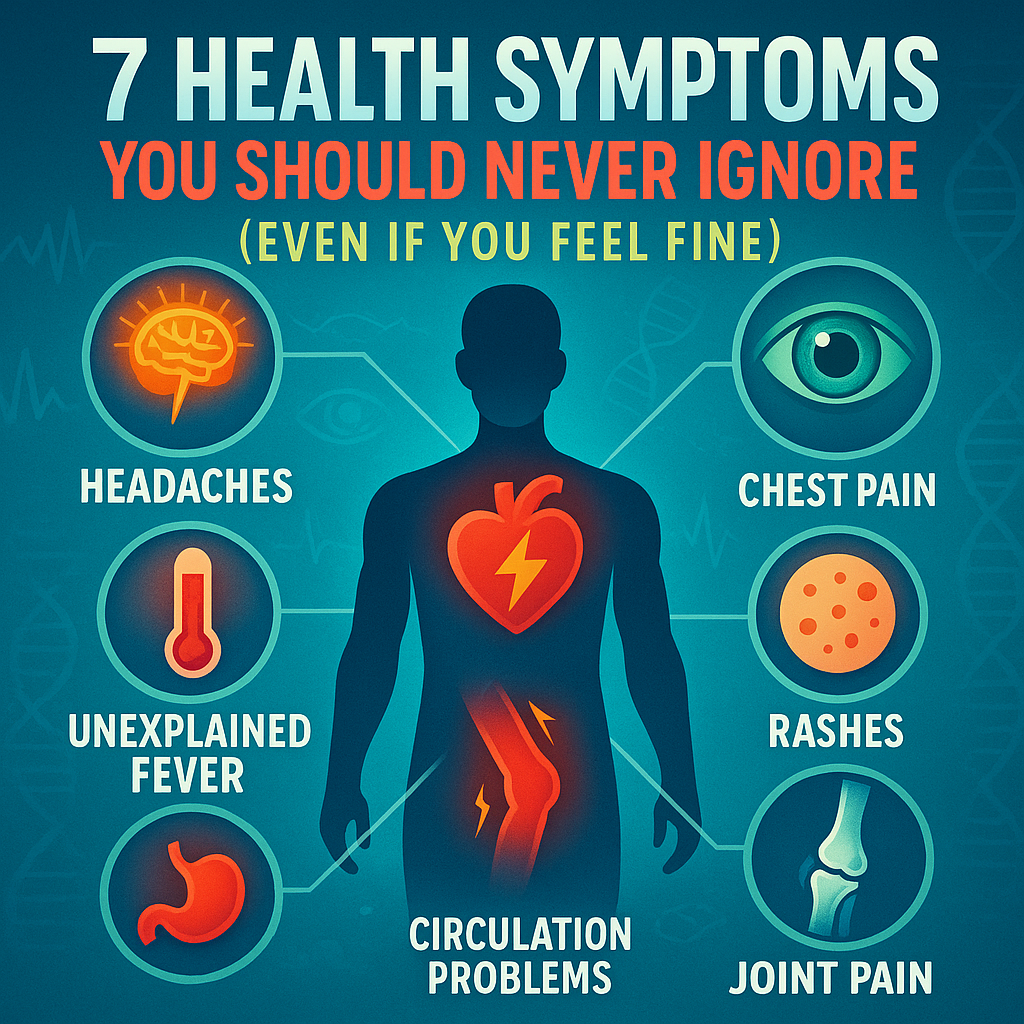Sometimes your body whispers before it shouts. And while we’re all guilty of brushing off a weird ache or occasional fatigue, certain symptoms—especially when persistent—can be red flags. You don’t have to panic. But you do have to listen.
This isn’t about becoming a hypochondriac. It’s about knowing when a check-up could save you from something more serious down the line. Here are 7 symptoms you should never ignore—even if you feel mostly fine otherwise.
1. Persistent Fatigue
We all feel tired after a long day, but if you’re dragging for weeks—even after getting enough sleep—it could be more than just “life stress.” Chronic fatigue can signal a variety of underlying issues including:
- Anemia (low iron)
- Hypothyroidism
- Sleep apnea
- Chronic infections
- Vitamin D or B12 deficiency
Real-life example: Sarah, a 32-year-old marketing manager, blamed her constant fatigue on burnout. Blood tests revealed low iron levels and an underactive thyroid. With a few lifestyle tweaks and medication, her energy returned in weeks.
2. Unexplained Weight Loss or Gain
If your weight suddenly drops or climbs by more than 5–10% within a couple of months—and you haven’t changed your diet or activity level—your body could be responding to a deeper issue. Common causes include:
- Thyroid disorders (hypo- or hyperthyroidism)
- Undiagnosed diabetes
- Digestive disorders (like celiac or Crohn’s disease)
- Stress-related hormonal imbalances
- Even certain types of cancer
Tip: Don’t jump to conclusions, but don’t ignore it either. Track your intake, movement, and symptoms to give your doctor a clearer picture.
3. Frequent Headaches
Headaches can be caused by dehydration, caffeine withdrawal, or screen fatigue. But if you start getting them more often, or they suddenly change in intensity or location, it’s time to take note. Possible reasons include:
- High blood pressure (especially if accompanied by dizziness)
- Chronic tension or cluster headaches
- Vision issues or eye strain
- Brain-related issues (though rare)
Pro tip: Keep a headache journal: time of day, triggers, food, water intake, and screen time. Patterns often reveal the cause.
4. Shortness of Breath
Feeling winded after a run is normal. Struggling to breathe after climbing stairs or doing light chores? That’s worth checking out. Possible causes include:
- Anemia (not enough oxygen in the blood)
- Asthma or allergies
- Heart conditions
- Respiratory infections or lung issues
Story: Josh, a 40-year-old dad of two, noticed he was out of breath carrying groceries. A check-up revealed early signs of coronary artery disease. Early treatment helped him avoid a major scare.
5. Changes in Bowel or Bladder Habits
No one likes to talk about it—but your body’s waste habits are strong indicators of your health. Watch for:
- Constipation or diarrhea lasting more than a few days
- Blood in stool or urine
- Sudden urgency or pain when urinating
- Unusual changes in color, frequency, or smell
It could be: Irritable bowel syndrome, food intolerances, urinary tract infections, or even early signs of colon or bladder issues. Never feel embarrassed to bring this up with your doctor—they’ve heard it all before.
6. Numbness or Tingling in Hands or Feet
We’ve all had a foot “fall asleep.” But if tingling or numbness becomes frequent—especially in the same area—it could signal nerve trouble. This can stem from:
- Carpal tunnel syndrome
- Peripheral neuropathy (often linked to diabetes)
- Vitamin B12 deficiency
- Pinched nerves in the back or neck
- More rarely: stroke symptoms (especially if sudden and one-sided)
Rule of thumb: If you also have weakness, slurred speech, or confusion—go to the ER immediately. Stroke symptoms are a true emergency.
7. A New Lump or Bump
Not all lumps are dangerous—but they should all be checked. This includes breast lumps, swollen lymph nodes, hard masses under the skin, or anything that’s growing, changing shape, or feels odd.
Could be: Cysts, infections, benign growths—or, in rare cases, early signs of cancer. The only way to know is to let a professional evaluate it.
Bonus tip: Get comfortable doing monthly self-checks (especially breasts and testicles). Knowing your “normal” helps you catch changes fast.
When to See a Doctor
If you’ve experienced any of the above for more than 1–2 weeks, or if your gut tells you something’s off—don’t wait. You don’t need to have all the answers. That’s what doctors are for.
Even if the checkup turns out fine, the peace of mind is worth it. And if something is wrong, catching it early could make all the difference.
How to Advocate for Yourself at Appointments
- Write down your symptoms: When they started, how often, how intense, and any patterns.
- Be honest: It’s tempting to say “it’s no big deal,” but your doctor can’t help without the full picture.
- Ask questions: Don’t leave feeling confused. Ask for explanations, alternatives, and clear next steps.
Bonus: Prevention Habits That Keep You Ahead
While symptoms tell you something's already wrong, prevention is about staying ahead of the game. Here are a few habits to build now that can help you avoid major health issues later:
- Annual check-ups: Especially if you’re over 30 or have a family history of illness.
- Blood work once a year: Tracks inflammation, hormone levels, vitamin deficiencies, and more.
- Know your numbers: Blood pressure, cholesterol, blood sugar—all crucial indicators.
- Eat more plants and less processed food: Nutrition really is medicine.
- Move daily: Even a 15-minute walk counts.
- Manage stress and sleep: Your mind and body are deeply connected.
Final Thoughts
Your body is smart. It gives you signals when something needs attention. You don’t need to panic—but you do need to listen. Health isn’t just about feeling “okay.” It’s about being proactive, informed, and in control.
Your Turn: Have you ever ignored a symptom that turned out to be something important? Share your story in the comments—and remind someone else to schedule that check-up today.


